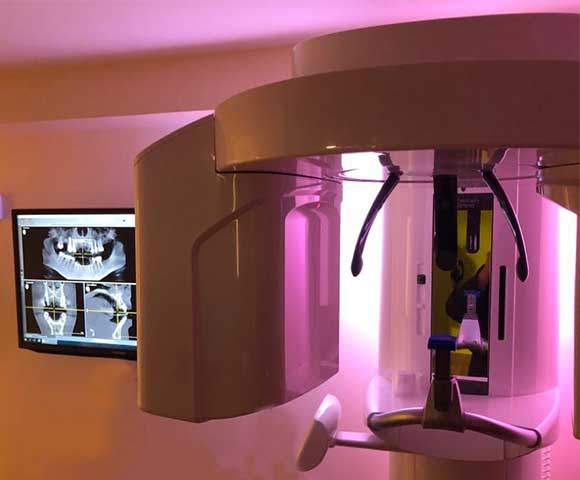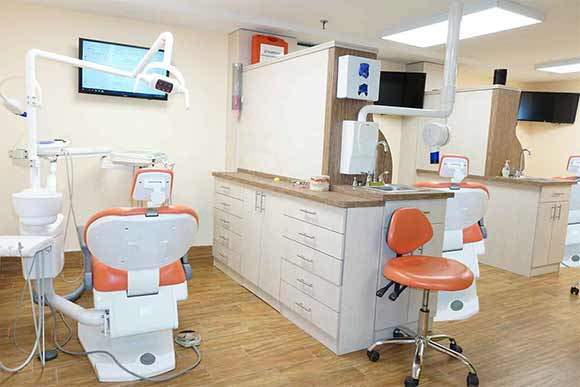ECO Dental NY
Innovative Technology
& Certified Dentists
With over 20 years of dental experience and
experience with implants, we are experts in all facets
of dentistry services.


Best Dentist and Dental Implants in Brooklyn 11229
At ECO Dental NY, we are dedicated to providing our patients with the best dental care quality designed to restore, enhance, and maintain the health and beauty of your smile. Our experienced doctors and dental hygienists, adhere to the highest professional standards to provide exemplary service in all aspects of cosmetic, periodontic, orthodontic, restorative, and general dentistry.
We use cutting-edge technology including digital x-rays, quiet electronic drills and dental air abrasion tools. Our facility is continually advancing as our dentists frequently attend and participate in continuing education courses and seminars throughout the country.

Natalia Blazhkevich

Our Promise
We Take Pride In Our State-Of-The-Art Facility.
In an effort to provide our patients with the most advanced dental care in Brooklyn, our office is fully equipped with the latest technology and devices.
#1 Dental Office in Brooklyn 11229
What Can We Do For You?
SMILE GALLERY
We Love Them
What Our Clients Have To Say



we love them
what our clients have to say



Pricing Plans
Dental Implants
$899
starting at
- Consultation
- X-ray
- Placing implant
Cosmetic Crown
$699
starting at
- Consultation
- X-ray
- Crown
Teeth Whitening
$499
Per session
- Consultation
- Cleaning
- Zoom Whitening
ECO Dental NY
Certified Dentist Doctors in Brooklyn 11229
With over 20 years of dental experience with implants, and modern technology we are experts in all facets of dentistry.
We do advanced surgical restorative, cosmetic and reconstructive procedures for adults and children.
We offer a wide variety dentistry services, from whitening (bleaching), revolutionary invisalign, oral surgery to complex smile makeovers
We adjust our dental services including revolutionary invisalign and oral surgeries to accommodate children
We offer breakthrough technology for restoring your smile and we specialize in dental implants and surgical procedures
Our office accepts a great variety of insurances and takes on patients without insurance for an affordable price
All our surgeries are furnished with state of the art equipment and maintained at the highest standards.
Most of our treatments are covered by a long term guarantee which will be discussed with you before beginning treatment.
Have a question that is not answered below? Feel free to give us a call and ask!
General Dentistry FAQs
Yes. We ask that you please arrive at least 15 minutes prior to your appointment to fill out new patient paperwork.
For your first appointment, you will need to bring the following with you:
- Personal identification (driver’s license, ID card, etc.)
- Insurance card
- New patient paperwork, if applicable
We recommend that patients expect to be in our office for about hour to one and a half hours for the first appointment.
Some patients do require antibiotics prior to having a dental procedure performed. By providing you with antibiotics before the procedure, your risk of infection or negative side effects after the procedure is lessened. If you already have a prescription for any pre-medications, please bring them to your appointment with you. Your dentist will discuss whether you need any antibiotics before you have a procedure done at your consultation.
Yes. Patients are supposed to see a dentist regularly, but many of them do not. It is not uncommon for us to hear that patients have avoided the dentist for many years. Often, patients only end up at the dentist because they are experiencing a dental problem. Regular dental visits are important because they provide you with a checkup on your oral health. While you may think that you will know when you have a cavity, it is actually the opposite. In fact, when tooth decay starts, you do not experience any symptoms. The moment you start to experience symptoms is when the tooth decay has progressed.
Early detection of tooth decay and periodontal disease can help save you money and prevent long treatments to help restore your teeth. It is recommended that you visit the dentist at least once every six months. Patients who suffer from periodontal disease or other dental problems may need to visit the dentist more often than every 6 months.
The best way to prevent tooth decay is to be proactive about brushing and flossing your teeth. You should be spending a minimum of two minutes every time you brush your teeth. The reason for this is because it takes at least two minutes to properly remove the plaque on your teeth, which is what eats away at the tooth’s enamel. You do want to make sure that you are not brushing too hard as this can lead to other problems such as receding gums.
Flossing should be done at least once per day to remove any food particle from between your teeth. If you fail to floss, you may experience tooth decay between your teeth.
You should also watch what you eat. Eating too much sugar and too many carbs will only increase your risk of tooth decay. Some of the foods you want to avoid include chips, candy, sticky foods, bread, and other foods that stick to your teeth. If you do eat any of these items, do make sure to brush and floss afterwards.
If you are unsure of how to brush or floss properly, please let us know. Our dentists will take the time to properly show you so that you can stay cavity free.
Brushing is not enough. Flossing your teeth removes any food particles that are stuck between your teeth. If you do not floss and leave the food particles between your teeth, bacteria feeds on it and thus causes tooth decay. One of the most common causes of cavities is failure to floss the teeth. The reason brushing is not enough is because it cannot get rid of ALL plaque, food particles, and bacteria in your mouth and this is because toothbrushes just cannot reach everywhere.
If you are not sure how to properly floss your teeth, please let our team know! We can help you learn how to floss.
You may be asked if you want to apply a fluoride to your teeth. Fluoride is a mineral and it can be found in water and foods such as apples, tuna, milk, kale, spinach, and tea. Sometimes, tap water contains fluoride in it, so if you drink from the tap or use tap water, you are receiving fluoride.
The reason fluoride is recommended is because it helps to fight against tooth decay. The mineral works to strengthen the enamel on your teeth thus making the teeth more resistant to staining, plaque, and bacteria. Studies have been performed that show the effectiveness of fluoride and a reduced rate of tooth decay in children.
If you are concerned that you are not receiving enough fluoride, please reach out to us today. If your drinking water lacks fluoride, there are fluoride supplements that you can take.
Morning breath is the enemy of everyone, but it is actually a common problem that many people face. As you sleep throughout the night, your saliva production is reduced. Saliva is responsible for helping to keep your mouth moist and fight bacteria that occurs in the mouth. When bacteria in your mouth is not washed away by saliva, it breaks down food particles and then produces Sulphur compounds. These compounds are what lead to the bad breath you are experiencing. If you are experiencing chronic bad breath throughout the day, please let us know as this could be the sign of a more serious problem.
Periodontal disease is gum disease but a more advanced form of it. This disease causes infection and inflammation in the bone structures of the mouth. If this disease is not treated, it can lead to tooth loss and loss of jaw bone. One of the most concerning things about periodontal disease is that if it is left untreated for long enough, it can lead to other conditions such as stroke, heart disease, prostate cancer, and more.
Here are some signs to watch out for:
- Swollen, red, or inflamed gums
- Bad breath
- Sensitive teeth
- Loose teeth
- Loss of teeth
- Pain when you chew
- Pus around the teeth
- Bleeding gums
- Painful gums
Prognosis for periodontal disease is good when treated in a timely manner. Advanced stages of the disease may require immediate tooth extractions and surgery. The only way to know if you have periodontal disease is to visit the dentist.
X-rays help us see what is going on in your mouth. There are some diseases that infect the inner tissues in your mouth, and we cannot see this with our eyes. X-rays allow us to get a better idea of what is going on in your mouth.
Some of the things x-rays alert us to include:
- Developmental problems in the mouth
- Cysts
- Abscesses
- Gum disease
- Tumors
- Decay between the teeth
- Infections in the bone
Having an x-ray performed allows us to catch any problems early on and treat those problems. When you come in for a consultation, we will take x-rays and the dentist will evaluate them. Your dentist will show you the x-rays and go over them with you, so that you understand what is going on with your oral health.
It can be a challenge to get children to brush their teeth. Many parents struggle with this. Our advice to you is to make it fun for them. If you are excited and happy about brushing your teeth, they will want to mimic what you do. The better your dental habits, the better theirs will be too. Being able to get your children to engage in brushing their teeth starts at a young age too. Children should have their gums brushed while they are babies and their teeth brushed as they erupt. It is recommended that your child receive dental care starting at 6 months or once the first tooth does erupt.
If you are finding it difficult to get your children to brush their teeth, talk to your dentist as they can provide you with some ideas and tips.
Yes. Your dentist does more than just look at teeth. In fact, your dentist will be able to check your dentures to ensure they fit properly and make any adjustments that are needed. While you may not have to worry about tooth decay anymore, you do need to worry about sores from poor fitting dentures and oral cancer. Our dentists can provide you with the proper screenings to ensure you are in good oral health, even with dentures.
If you are finding it difficult to get your children to brush their teeth, talk to your dentist as they can provide you with some ideas and tips.
Diabetes is linked to gum disease, so it is important for you to continue to visit the dentist. If you do not have properly controlled blood sugar levels, you may experience more tooth decay, gum disease, and tooth loss. Gum disease can be controlled, but regular visits to the dentist play a huge role, so you must stay on top of your oral health. If you experience any issues, it is important to speak with your dentist immediately.
Unfortunately, chemotherapy and radiation can cause you to experience several dental issues including:
- Sores
- Dry mouth
- Infections
- Bleeding in the lining of the mouth
- Bleeding gums
- Pain
- Soreness
Since your immune system is weakened, it can be difficult to control some dental issues. There are specialized mouthwashes that can be used to help alleviate any discomfort you may experience. You should continue to visit our office to have regular checkups performed.
One of the best at-home care routines you can do is use toothpaste designed to combat sensitivity. These toothpastes work well and within just a few weeks, you should notice that your sensitivity decreases.
Sometimes, reducing sensitivity may mean changing your diet. For instance, foods that have high acid levels can cause your teeth to be sensitive and may even stop the sensitivity toothpaste from working.
If you have tried reducing your intake of highly acidic foods and you have tired using sensitivity toothpaste with no luck, talk to us! We can help. There are special compounds that are able to be applied to your teeth and the roots of the teeth to help stop sensitivity.
Sealants are a thin coating that is placed on the chewing surface of both the premolars and molars to protect them against tooth decay. The sealants work as a barrier and are most commonly used for children, but adults can receive them as well.
If you are interested in sealants or having sealants placed on your children’s teeth, please talk to us about them today.
It depends. The whitening toothpastes on the market can vary in the results that they provide. These toothpastes work by removing what are considered surface stains from the teeth. Deep or set in stains are not removed by these toothpastes and must be removed using professional teeth whitening services.
The biggest problem with toothpastes that do whiten is that they often destroy the enamel on your teeth in the process. Continued use of these harsh products can lead to problems with your tooth enamel and cause tooth sensitivity.
Before you try any toothpaste that promises to whiten, talk to your dentist.
It varies. However, in general, you can expect the results to last for a couple years. You may notice that the results do start to fade but you can have a touchup performed whenever it is needed. It is important to keep in mind that if you smoke, drink coffee or red wine, and eat acidic foods such as tomato sauce, you may notice that the results fade quicker than expected.
There are many reasons why your teeth may no longer be white and darkened in color. Some of the substances that can cause this to happen include tobacco, certain drinks, and certain foods. One of the substances that causes teeth to darken the most is hot tea and coffee. The reason behind this is because the temperature of the drink causes the teeth to contract and expand, which allows the stains to set in. Also, acidic foods open the pores on your teeth and allow stains to set in. Avoiding these foods and working with our dentists to have your teeth whitened can improve your smile.
Ask the friendly staff at Eco Dental NY for more information on sensitive teeth.
Yes. In fact, the American Dental Association recommends against it. The reason for this is because there are many problems that can arise. Some of the symptoms you may experience after you have an oral piercing include swelling, pain, infection, scarring, tooth loss, drooling, loss of taste, and chipped teeth. If you want to have a piercing in or around your mouth, it is best to speak with your dentist first. If you have piercings already, you should receive a checkup to ensure there are no problems.
We do not know. It is true – no one knows the exact cause of canker sores. There are some factors that can increase your chances of developing canker sores and those include allergies, genetics, mineral and vitamin deficiencies, and stress. You may develop a canker sore if you experience trauma in your mouth as well. Some other causes include sharp-edged foods causing injuries that lead to sores, acidic fruits, biting your cheek, poorly fitted braces or dentures, and brushing too hard with your toothbrush.
If you do have a canker sore, you must take steps to keep it clean, as this will promote healing. First, rinse your mouth out with warm salt water. You can use any over the counter treatments to aid in healing. If your canker sore lasts more than two weeks, visit us.
It is still harmless. Some of the potential problems linked to smokeless tobacco include:
- Problems chewing
- Lumps or white patches in the mouth
- Feeling like you have something stuck in your throat
- Prolonged sore throat
- Sores in the mouth
- Problems with the movement of your jaw or tongue
If you experience any of the above symptoms, visit our dental office right away.
Yes. A tooth that has been knocked out can usually be saved but this also depends on several factors. First, you must recover the tooth and you must get to our office ASAP.
If your tooth is knocked out, follow these tips to improve the chances that it can be saved:
- Find the tooth
- Do not touch the root of the tooth
- Rinse the tooth off but do not try to scrub it
- Do not place the tooth in the socket
- Place the tooth in your mouth, specifically under your tongue
- Get to our office immediately
If you cannot recover the tooth, make sure you still visit our office so that we can check for trauma and go over your options with you. Also, if you cannot place the tooth in your mouth, keep it in a cup of milk.
Mouthguards are recommended for a few reasons and they work to protect your teeth from injury. Anyone who plays sports should wear a mouthguard to prevent any serious problems if they are hit in the face with a ball or by someone else. The mouthguard works to absorb some of the impact and can prevent your teeth from being knocked out.
Another reason a mouthguard may be recommended is if you experience teeth clenching. In these cases, the mouthguard prevents damage to the teeth.
A custom-fitted mouthguard is the best and offers the most protection. You can use over the counter options, but they are not as effective. If you would like to discuss a mouthguard, call our office today.
If you notice that your gums are bleeding, you need to pay attention to them. Typically, bleeding gums are the first sign that you may have gum disease; however, it is not always a sign of gum disease. If you brush too hard, your gums could bleed. If you experience inflamed gums, it is best to brush your teeth, as this can help reduce the inflammation.
Bleeding gums should always be checked by your dentist to rule out gum disease. The earlier gum disease is caught, the better the outcome for you. If you have bleeding gums accompanied with pain or discomfort, it is best to come into our office right away.
Pregnancy gingivitis is a concern in pregnant women. This is a temporary condition, but it can cause bleeding, swelling, pain, and tenderness of the gums. If gingivitis is not treated, it can lead to periodontal disease, which is a more advanced form of gum disease and it can lead to tooth and bone loss. Studies that have been conducted show that poor oral health can affect an unborn baby and lead to low birth weights, preterm birth, and other complications. If you are pregnant, it is recommended that you visit the dentist regularly.
